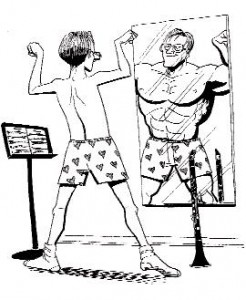 |
| source: ihatepresentations.com |
The "confidence gap" is a phenomenon I and many others have covered in spades before - the fact that women tend to have less confidence in their own abilities than men and the corresponding detrimental impact on women's advancement in the workplace, particularly in STEM fields. An interesting academic article (h/t CNET) validates this phenomenon, but with a new twist -- it turns out that it may not be that women have unreasonably low self-perception, but rather that men may have a delusionally high self-perception. And that self-perception translates into self-selecting out of STEM-based careers. Or as the study puts it, "[t]he findings suggest that gender gaps in STEM fields are not necessarily the result of women underestimating their abilities, but rather may be due to men overestimating their abilities."
The article describes a pair of studies. In the first study, college students, mostly freshmen, were given a pair of 15-minute tests, comprising 7 SAT questions each. Between the first and second tests, the students were asked to estimate their performance, and were subsequently given a score for the first test. The students then took a second test and were asked to estimate their performance. After the first test, the men over-estimated their performance and women slightly underestimated their performance. On the second test, those who had over-estimated their performance the first time did slightly worse, and those who had under-estimated their performance did slightly better.
In the second study, only one test was given, after which students were asked to estimate their own performance and state whether they expected to pursue math-related studies. Those who over-estimated their own performance were more likely to be intending to pursue math than those who under-estimated their performance. It's worth noting that while men were substantially more likely to over-estimate their performance than women, the women who did over-estimate their own performance were equally likely to intend to pursue math-related courses and careers as the men who similarly had high self-perception.
So the bottom line seems to be that we should be encouraging kids to see themselves as more successful than they really are in order to keep them going. Maybe there is something to the trophies for everyone philosophy.

